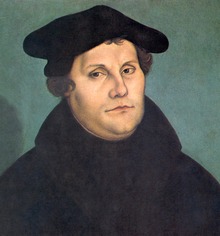Martin Luther (religious leader)
| Martin Luther | |
|---|---|

Martin Luther (1529) by Lucas Cranach the Elder
| |
| Born |
10 November 1483 Eisleben, County of Mansfeld in the Holy Roman Empire |
| Died |
18 February 1546 (aged 62) Eisleben, County of Mansfeld in the Holy Roman Empire |
| Education | University of Erfurt |
| Occupation | |
| Notable work | |
| Spouse(s) | Katharina von Bora |
| Children | |
| Theological work | |
| Era | Reformation |
| Tradition or movement | Lutheranism |
| Signature | |
|
| |
|
|
Martin Luther, O.S.A. (/ˈluːθər/;German: [ˈmaɐ̯tiːn ˈlʊtɐ]; 10 November 1483 – 18 February 1546) was a German professor of theology, composer, priest, monk, and a seminal figure in the Protestant Reformation.
Luther came to reject several teachings and practices of the Roman Catholic Church. He strongly disputed the Catholic view on indulgences. Luther proposed an academic discussion of the practice and efficacy of indulgences in his Ninety-five Theses of 1517. His refusal to renounce all of his writings at the demand of Pope Leo X in 1520 and the Holy Roman Emperor Charles V at the Diet of Worms in 1521 resulted in his excommunication by the Pope and condemnation as an outlaw by the Holy Roman Emperor.
Luther taught that salvation and, consequently, eternal life are not earned by good deeds but are received only as the free gift of God's grace through the believer's faith in Jesus Christ as redeemer from sin. His theology challenged the authority and office of the Pope by teaching that the Bible is the only source of divinely revealed knowledge from God and opposed sacerdotalism by considering all baptized Christians to be a holy priesthood. Those who identify with these, and all of Luther's wider teachings, are called Lutherans, though Luther insisted on Christian or Evangelical (German: evangelisch) as the only acceptable names for individuals who professed Christ.
...
Wikipedia
